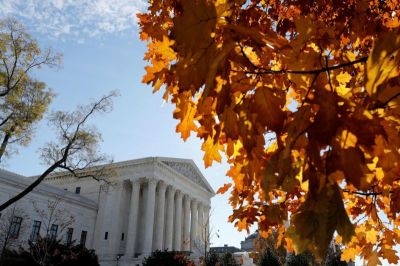Queer theory reaches the Supreme Court

The justices appointed to our country’s most august court have been puzzling over the meaning of the word “sex” as written in the Constitution. The several cases recently before SCOTUS bringing the meaning of “sex” to bear on the law include one in which an employee of a funeral home who once identified as a man decided to identify and dress as a woman. The individual in question was fired from his job.
The very fact SCOTUS is even debating the meaning of “sex” as written in the Constitution as denoting the human being as male and female is an indicator the ghostly penumbras of queer theorists Michel Foucault and Judith Butler, accompanied by the companionate spirit of deconstructionist Jacques Derrida, are haunting the chambers of the Supreme Court of the United states.
The case concerning the man who now identifies and dresses as a woman named Aimee Stephens is being argued on the bases of queer theory tenets, which are being presented by the defense as applicable to constitutional law that forbids discrimination of the basis of “sex.”
Among other things, queer theory holds that “sex” is indeterminate and can be reconfigured according to a plethora of genders. One’s identity is self-determined according to one’s perception of self, which perception can constantly be in flux from one day to the next. The idea the human race is divided into categories of male and female is held to be arbitrary, fungible and ultimately discriminatory. In the case of the former employee of the funeral home, the question goes beyond whether or not the perception of self as a member of the opposite sex is a valid identity for a particular individual. The larger question is whether or not the terms “male” and “female” are legitimate categories under law.
In more than one critical way, the majority of the court’s justices have already capitulated to queer theory, which essentially triumphed at the Supreme Court with the Obergefell v. Hodges decision of 2015. That decision struck a mortal blow at binary distinction between male and female by jettisoning the idea of marriage as between a man and a woman, a definition held to by all former civilizations throughout all time.
When such a radical deconstruction of an institution predating civilization occurs, the deconstruction of the meaning of humanity as male and female was sure to follow. The distinction between men and women having been erased from marriage and ratified by law was soon elevated as an infallible doctrine, effectually delivered ex cathedra by contemporary queer theory ideologues. For queer theorists, the binary distinction of the human race as observed by all civilizations from time immemorial was not just subject to malleability due to individual human caprice, but could and should be eradicated as an inherently discriminatory binary distinction.
To put it another way, Obergefell was a triumph for the contemporary philosophy of deconstructionism, which is dead set against prevailing societal norms. While obliteration of the institution of marriage by divorcing it from the male/female binary was THE major capitulation to deconstructionism’s inherently anarchical and nihilistic ideology, the current battles before SCOTUS concerning sexual identity continue as mere mop up actions.
But the capitulation of SCOTUS to queer theory in their Obergefell decision has not quite ended the discussion about what the term “sex” means. Still at issue, albeit increasingly peripherally, is whether or not the term “sex” still refers to the binary distinction of the human race as male and female; or if, according to contemporary queer theory—as noted above--“sex” now refers to an ever-evolving plethora of genders that categorize human identity according to preferred sexual behaviors.
The above means that the logical ramifications of queer theory go beyond the issues of same-sex marriage to encompass any kind of sexual activity that has been formerly judged as deviant. Since an individual’s sexuality is considered fluid; changeable at any point during an individual’s lifetime, there is no moral code that stabilizes and defines sexual identity or behavior; therefore, no pejorative judgments against any sexual identity or behavior are possible.
As Daniel Halperin has observed, “Queer is by definition whatever is at odds with the normal, the legitimate, the dominant. There is nothing in particular to which it necessarily refers. It is an identity without an essence. 'Queer' then, demarcates not a positivity but a positionality vis-à-vis the normative.”
Therefore, in the long run, sexual identity is not the one issue. Any fixed and stable definition of human identity is the issue. It follows that queer theory is at heart completely committed to anarchy and nihilism, to constant and unremitting opposition to the existing structures and institutions of society. Because of its belief in a neo-Lamarckian ongoing self-evolution, queer theory demands capitulation of all institutions to accommodation of the ever-changing self. That “self” is an intrinsically violent and continually disintegrating self. Queer theory, then, is essentially human individualism and free will run amok; let loose to create constant havoc. It could be categorized a terrorist ideology, committed as it is to constant destruction.
Those who oppose queer theorists’ doctrines of sexuality and identity see the theorists’ chaotic tenets of faith as a postmodern apologetic for deviancy, or at least what was once considered deviancy. For if one accepts the idea that whatever sexual impulse an individual has is essential to one’s identity, there is no such thing as sexual deviancy, as desire is perceived as springing from an uncorrupted inner self. Any desire is to be unquestioned and accepted. Consequently, queer theorists demand not just legitimization from current social institutions but the total destruction of those institutions, as they are perceived as inherently infected with ideas that oppose the anarchy of self. Self-identity as determined by one’s sexual proclivities necessitates evolution past the status quo—the norms of society. The institution considered to be most worthy of destruction because of its insistence on biblical sexual mores is the Church, as Albert Mohler, President of Southern Baptist Seminary brilliantly observes in his recent essay, The Cultural Left Bares Its Teeth: An Open Threat to Churches and Christians Who Hold to Biblical Conviction.
The dissemination and absorption of queer theory on a popular level means that the majority of people—overtly religious or not--who believe in the observed and scientific reality of human beings as male and female now find themselves in an inverted world.
For example, over the last year or so, ads have appeared featuring tampons for young “men”, also known as girls who identify as young men but whose reproductive organs still function normally; and razors for trans young girls who are growing beards because of hormone “therapy” designed to make them boys.
Those still attached to the reality of men as men and women as women also have watched the cult bolstered by queer theory trash women’s sports, jettison protection of women in shelters designed to prevent abuse by men; and commit to the drugging and mutilation of children and youths--all in the name of supposed freedom to choose one’s identity.
No rational human being actually believes there are an infinite number of genders. Nor does anyone other than a trans cult member wish to speak the gobbledygook trans language. No sane person truly believes men can become women (or vice versa) merely by thinking themselves to be so. Scarcely anyone really believes the man who now wishes to retain his job posing as a woman has in fact become a woman whose civil rights have been grievously violated.
So why are the ideas inherent to queer theory now seriously being considered by the highest court of the land?
The fact is that academicians, particularly those in the humanities, have by Jesuitical casuistry floated deconstructionist ideas in sheltered bubbles in which their critical dismantling of tradition and traditional modes of thought now find little opposition.
These destroyers of civilization have had for decades safe places from which they proclaim there is no such thing as objective reality, including the reality that the human race is divided into male and female. Safe in structures that would disintegrate were their own doctrines of postmodernist faith put into effect, they can from ivory towers proclaim reality is merely what each of us constructs for ourselves.
As Helen Pluckrose notes in her essay How French Intellectuals Ruined the West, “…postmodernists rarely explain themselves clearly and partly because of the inherent contradictions and inconsistencies of a way of thought which denies a stable reality or reliable knowledge to exist.” (Italics mine.)
Essentially, the idea that no stable reality exists and that the human being creates reality all on his or her own is the real issue before SCOTUS, which if it accedes to the anarchy inherent in queer theory, also will tear down its own house with its own hands.
For tearing down all former constructs and paradigms is essentially what deconstructionist philosophy, also termed queer theory by its proponents, is all about. What began in ivory towers has now trickled down into our legal system, becoming almost axiomatic.
Pluckrose adds, “If we see modernity as the tearing down of structures of power including feudalism, the Church, patriarchy, and Empire, postmodernists are attempting to continue it, but their targets are now science, reason, humanism and liberalism. Consequently, the roots of postmodernism are inherently political and revolutionary, albeit in a destructive or, as they would term it, deconstructive way…The desire to ‘smash’ the status quo, challenge widely held values and institutions and champion the marginalized is absolutely liberal in ethos.
“Whilst the first postmodernists mostly challenged discourse with discourse, the activists motivated by their ideas are becoming more authoritarian and following those ideas to their logical conclusion. Freedom of speech is under threat because speech is now dangerous. So dangerous that people considering themselves liberal can now justify responding to it with violence. The need to argue a case persuasively using reasoned argument is now often replaced with references to identity and pure rage.”
Ultimately queer theory combined with the idea of a “living” Constitution would ensure there is no stable law governing any type of human behavior. For such theorists, there can be no commitment to any binary distinction, including that of good and evil; right and wrong, reality and unreality as formerly defined by faith, reason and science.
The only commitment is to the collapse of civilization in favor of a constantly indeterminant future in which only power matters. The law detached from any overarching meaning, most especially including the definition of the human being as male and female, is detached from reality itself and therefore subject to no other law than the law of the jungle.
In conclusion, queer theory is not about human rights at all, including the so-called rights of the employee of the funeral home who has declared himself to be a woman.
No, the goal of queer theorists is to collapse all identifying markers for the human race, spiritual, national, racial and ethnic; but in the case of Judaism and Christianity, to eradicate entirely the idea of humanity, male and female, as created imago dei.
SCOTUS should realize it has been considering the arguments of those who want to destroy the foundations of Western civilization, starting with the constitutional law the justices have pledged to uphold.
Fay Voshell holds a M.Div. from Princeton Theological Seminary, which awarded her its prize for excellence in systematic theology. She has been a frequent contributor to American Thinker. Her thoughts also have appeared in many other online magazines, including The Christian Post, CBN, Russia Insider, National Review, LifeSiteNews and RealClearReligion. She may be reached at fvoshell@yahoo.com




























